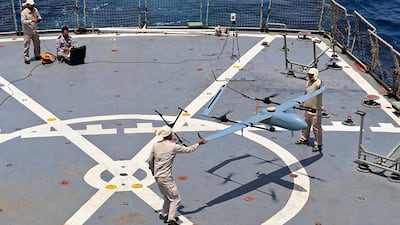The US and Iraq have condemned Iranian cross-border attacks that hit targets in the Kurdistan Region of Iraq on Sunday, killing a member of a Kurdish militia.
The Central Command, the authority responsible for American forces in the Middle East, said on Monday that the missile and drone strikes had taken place “near Erbil” governorate.
Iraq also condemned the attacks on Monday, the state news agency INA reported, citing its foreign ministry.
“The repeated attacks carried out by Iranian and Turkish forces with missiles and drones on the Kurdistan region are a violation of Iraq's sovereignty,” the foreign ministry said.
Nabaz Abdulhamid, mayor of the governorate's eponymous capital, told news outlet Rudaw that Iranian-Kurdish opposition groups were the target of the strikes along the provincial border.
Iran accuses the opposition groups of involvement in anti-government protests that have swept the country since mid September.
The Islamic Revolutionary Guard Corps, a branch of Iran’s armed forces, claimed responsibility for the attack in a post on social media site Telegram, saying its target was “separatist anti-Iranian terrorist groups”.
The Democratic Party of Iranian Kurdistan, a group that has previously been the target of Iranian attacks, said the drones and missiles also struck a refugee camp.
“A member of the peshmerga was killed in an Iranian strike on the area of Koysinjaq”, also known as Koya, Ali Boudaghi, a party official, told AFP on Monday.
The term peshmerga generally refers to Kurdish fighters from northern Iraq who are a part of the official security forces of the Kurdistan regional government.
However, the term is sometimes used to refer to fighters aligned with the Democratic Party of Iranian Kurdistan.
In pictures: Iran's fleets of drones
On Saturday, Esmail Ghaani, commander of the IRGC's Quds Force, was in Baghdad where he reportedly warned that Iran could mount a ground offensive into the semi-autonomous Kurdish region of Iraq to attack dissidents blamed by Tehran for stirring up unrest.
On Monday, Iran hinted at further action in the Kurdish region, should the Kurdistan regional government or the Iraqi central government in Baghdad be unable to stop the activities of separatist groups.
Iranian Foreign Ministry spokesman Nasser Kanani stressed that Iran “desires that there be no threat to Iran's security from Iraqi territory”.
“We hope that the Iraqi government will prevent the activities of separatist and terrorist groups against the security of Iran and its borders by expanding its sovereignty and deploying border guards at the common border, so that Iran does not have to take other deterrent measures to repel threats,” he said.
About 400 protesters and 50 members of the security forces have died over two months of protests in Iran. Demonstrators initially called for more women’s rights before demanding improved living conditions amid high inflation and shortages of basic goods.
A series of missile and drone attacks on Iraq's Kurdish region last week, which were also aimed at the Democratic Party of Iranian Kurdistan in Koya, killed at least two people.
Those attacks were widely condemned by the UN and the Iraqi government as an infringement of Iraq’s sovereignty.
“Repeated attacks, violating Iraqi sovereignty, must cease,” the UN Assistance Mission for Iraq (Unami) said in a statement on Monday.
“Such aggression not only recklessly heightens tensions but also causes tragedy,” it said.
“Whatever external score a neighbouring country is seeking to settle, the use of established diplomatic instruments is the only way forward.
“Iraq should not be used as an arena to settle scores and its territorial integrity must be respected.”
The regional government in Kurdistan said the attacks were an “unjustified and flagrant violation of international norms and good neighbourly relations”.
In footage posted by Iraqi security monitoring account Tammuz Intel on Monday morning — which could not immediately be verified — heavy gunfire could be heard at night, reportedly by Kurdish fighters trying to shoot down an Iranian drone.
A buzzing sound similar to that of a propeller-driven drone could be heard overhead. In other footage posted online, a large explosion could be seen from Koya University.
Koya has been the target of Iranian attacks several times. A salvo of Iranian missiles struck a Democratic Party of Iranian Kurdistan office there in 2018, killing 18 people.












